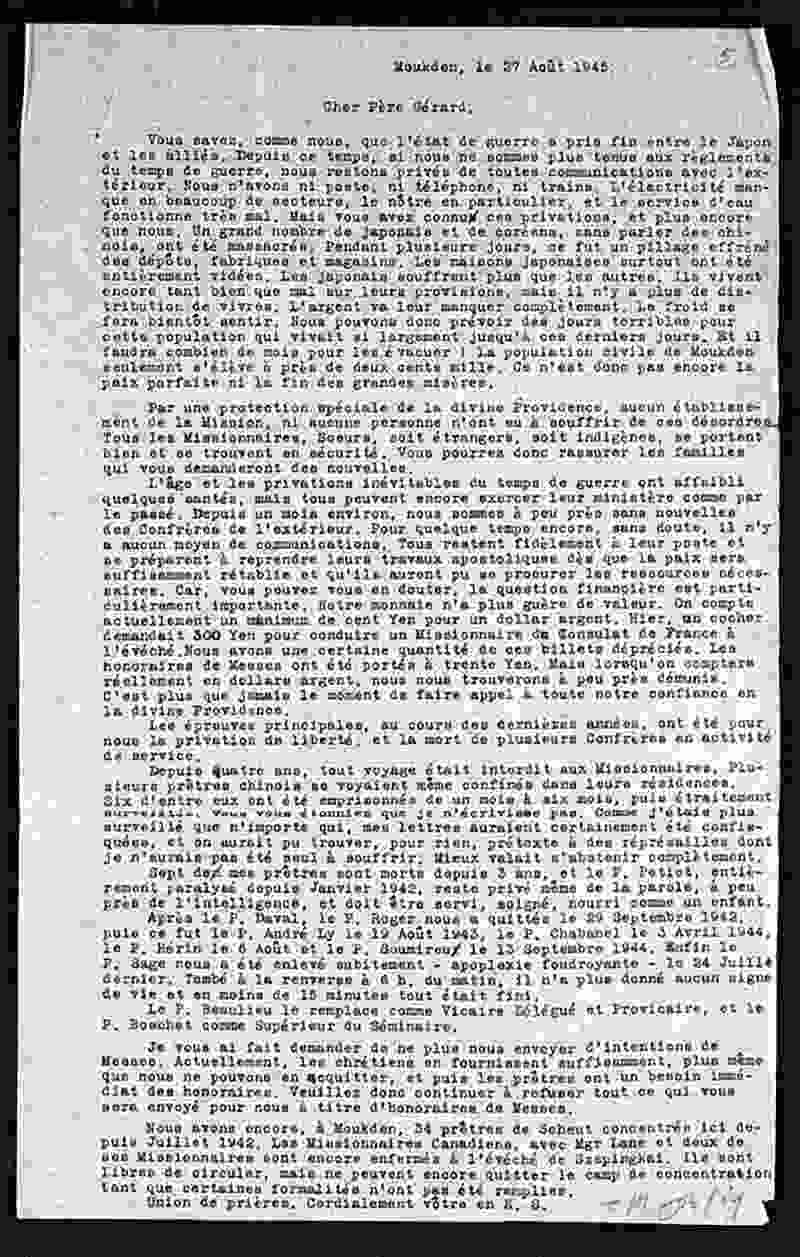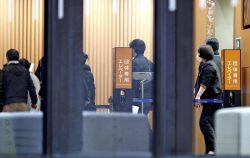
A document found at Paris Foreign Missions’ archive that details life in Manchuria following the Soviet Union’s 1945 invasion
14:58 JST, January 24, 2022
A document has been found in Paris describing the circumstances under the Soviet occupation of Manchuria (see below) following Japan’s defeat in World War II.
The document takes the form of a report that was sent to the headquarters of a Paris-based missionary organization by someone thought to have been a Christian missionary active in Manchuria in the city of Mukden, now known as Shenyang, China.
“This is an important document in which the immediate aftermath of the Soviet invasion of Manchuria was recorded by a third party other than Japan and the Soviet Union,” said Kiyofumi Kato, associate professor on the history of international relations of East Asia at the National Institute of Japanese Literature and the person who uncovered the report.
The document was found at Paris Foreign Missions, a Catholic missionary organization that continues to carry out missionary activities in Japan, China and the Korean Peninsula, among other locations.
Dated Aug. 27, 1945, the roughly A4-sized typewritten report was found in an archive housing missionaries’ reports and other documents. It bears the signature of the presumed author, though the name is difficult to decipher.
“The information contained in the report was very likely gathered by missionaries and local Christians,” Kato said. “Given the document’s assertive tone, I think church officials actually witnessed the events to which it pertains.”
The bulk of the report concerns hardships suffered by the missionaries and others at the time. One section details how people were isolated with no means of communication with people outside the area.
It also records locals’ daily lives, saying, “Electricity is lacking in many areas, especially in ours, and the water system is very poor.”
The report also describes the dismal situation faced by Japanese and locals. For example, it says a large number of Japanese and Koreans were massacred along with Chinese people, and that looting took place at warehouses, plants and stores over several days.
The document also expresses concerns over the future outlook for Japanese, saying: “They were living at subsistence level using their own provisions, but food was no longer being distributed. … We could expect some terrible days ahead for this population that had lived comfortably until these last few days.”
The contents of the report are believed to have been conveyed to the Vatican, the seat of the Roman Catholic Church. Saho Matsumoto, a professor at Nihon University who is familiar with the modern history of the Vatican, said: “The report was probably not written to ask the Vatican to take measures to address the situation. Writing about local situations was one of the tasks carried out by missionaries.
“Given that Japan’s defeat was a historic milestone, this kind of detailed information was valuable for the Vatican in terms of formulating future responses; it was also important in terms of raw intelligence. I don’t think they drew up specific measures based solely on the report, but it certainly provided information that would have helped people in the Vatican and Paris headquarters to make decisions.”
‘Valuable statement’
Kato’s focus, meanwhile, centers on the details of the lives of Japanese people in Manchuria immediately after the end of the war. According to Kato, many of the official documents of Manchukuo — officially the State of Manchuria — and Japan’s Kwantung Army materials that had been responsible for the effective control of the region were discarded or seized by Soviet forces upon the war’s end.
About 245,000 Japanese are said to have lost their lives in connection with the Soviet invasion and following occupation. Many Japanese children became separated from their families and became orphans in China. However, the dismal circumstances endured by Japanese people were mostly recounted by repatriates.
“This document is valuable in that it provides objective information about those days and helps us start a new investigation,” Kato said. He plans to look at documents stored in the Vatican City and study the relationship between Manchukuo and the Vatican.
Soviet occupation of Manchuria
On Aug. 8, 1945, the Soviet Union declared war on Japan in violation of the Japanese-Soviet Neutrality Pact that guaranteed each other’s territorial inviolability. The Soviet Union invaded Manchuria and other territories on Aug. 9 and occupied the region until the spring of 1946.
Top Articles in Society
-

Man Infected with Measles Reportedly Dined at Restaurant in Tokyo Station
-

Man Infected with Measles May Have Come in Contact with Many People in Tokyo, Went to Store, Restaurant Around When Symptoms Emerged
-

Woman with Measles Visited Hospital in Tokyo Multiple Times Before Being Diagnosed with Disease
-

Australian Woman Dies After Mishap on Ski Lift in Nagano Prefecture
-

Foreign Snowboarder in Serious Condition After Hanging in Midair from Chairlift in Nagano Prefecture
JN ACCESS RANKING
-

Japan PM Takaichi’s Cabinet Resigns en Masse
-

Japan Institute to Use Domestic Commercial Optical Lattice Clock to Set Japan Standard Time
-

Israeli Ambassador to Japan Speaks about Japan’s Role in the Reconstruction of Gaza
-

Man Infected with Measles Reportedly Dined at Restaurant in Tokyo Station
-

Videos Plagiarized, Reposted with False Subtitles Claiming ‘Ryukyu Belongs to China’; Anti-China False Information Also Posted in Japan





















